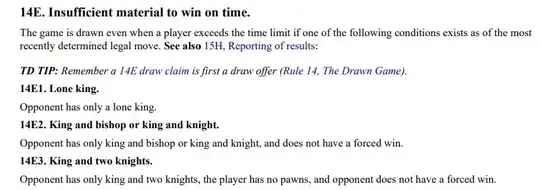When the flag falls, that itself is a claim which must be made by a player. See rule 13C:
13C. Time forfeit.
a. Non-Sudden Death: The player who properly claims that the opponent has not completed the prescribed number of moves in the allotted time wins the game, provided that the claimant has mating material (14E) and a reasonably complete scoresheet (13C7) when the flag falls (5G). Move counters, on clocks equipped with them, may not be used as the only evidence in claiming that the prescribed number of moves were not
completed in the allotted time.
b. Sudden Death: The player who properly claims that the opponent has not completed the game in the allotted time, and has mating material (14E), wins the game. A scoresheet is not required to win on time in a sudden death time control (15C).
And see 16Y:
16Y. Assisting players with time management prohibited.
No one, except a player’s opponent, may call that player’s attention to the fact that a flag is down, the opponent has moved, or the player has forgotten to press the clock after moving. These prohibitions also apply to the director.
However, assuming the claim of the flag fall is properly made, the game is then drawn if mating material is not present, according to 14E:
The game is drawn even when a player exceeds the time limit if one of the following conditions exists as of the most recently determined legal move.
The director should record the correct result, making corrections if needed. See the TD Tip for 15I, which states in part:
Sometimes errors occur in the reporting of game results. Those errors need to be corrected immediately.
As for other time controls:
Quick chess uses the same rules as regular, with the exception that scorekeeping is not required. So this will be the same.
Blitz rule 8d indicates that insufficient material when the flag falls results in a draw. (Also see blitz rule 7c.) So this appears to also be the same.
Correspondence rule 13 says simply:
If a player oversteps the time control, he or she will forfeit the game.
This is different; there's no insufficient material rule here.
For online games, it's ambiguous because a platform might not comply 100% with USCF rules. Online rule 10A says:
Many service providers automatically rule games drawn under several game situations, or they alert the player that the position is drawn. Such assistance is allowed in online play because all players are using the same host system/game interface and, as a result, are afforded the same assistance during their games. When a service provider’s automatic rulings differ from US Chess rules, organizers and directors shall include these differences in their pre-event publicity.
